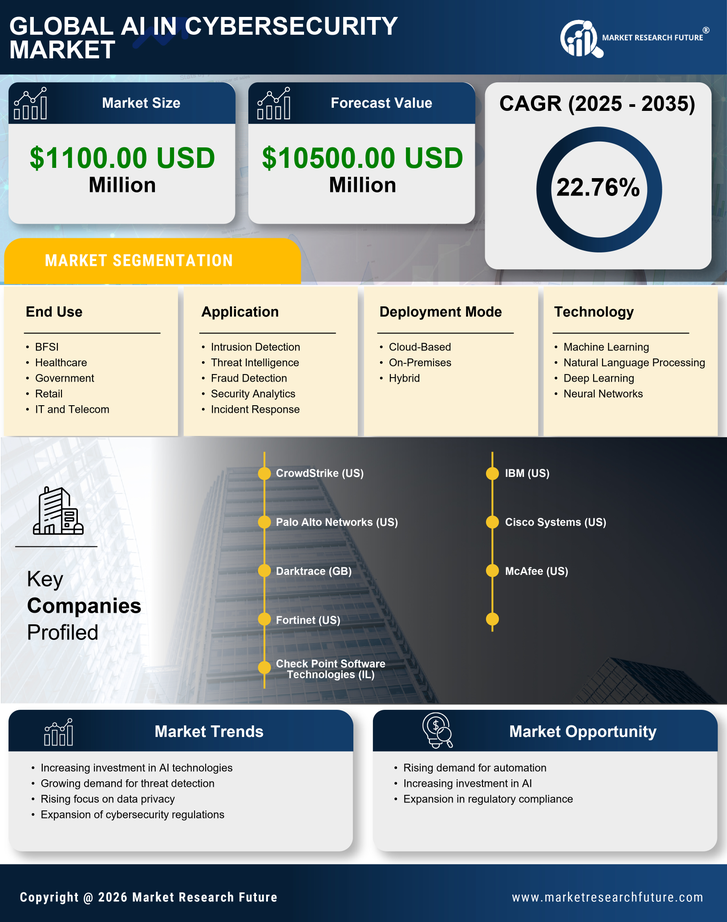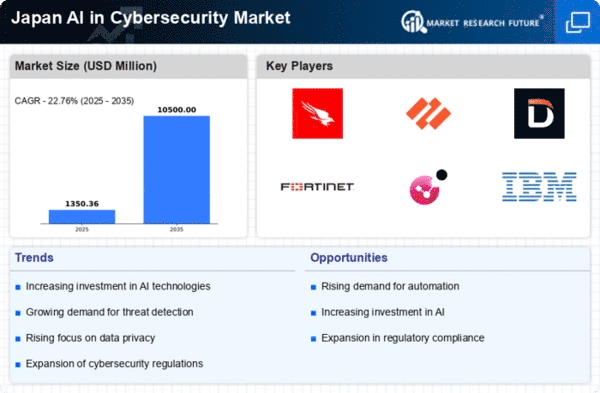Evolving Regulatory Landscape
The evolving regulatory landscape in Japan is a critical factor influencing the ai in-cybersecurity market. As data protection laws become more stringent, organizations are required to implement robust cybersecurity measures to comply with regulations. The Personal Information Protection Act (PIPA) mandates that businesses take necessary precautions to protect personal data, which has led to increased investments in AI technologies for compliance purposes. Companies are turning to AI-driven solutions to automate compliance monitoring and reporting, thereby reducing the risk of penalties. This regulatory pressure is expected to drive market growth as organizations prioritize compliance and data security.
Growing Demand for Automation
The increasing demand for automation in cybersecurity processes is a notable driver for the ai in-cybersecurity market. Organizations in Japan are seeking to streamline their security operations to improve efficiency and reduce human error. AI technologies facilitate automation by enabling systems to learn from data patterns and respond to threats autonomously. According to industry estimates, the automation of cybersecurity tasks could reduce operational costs by up to 30%. This trend is particularly relevant in sectors such as finance and healthcare, where data protection is paramount. Consequently, the push for automation is likely to accelerate the adoption of AI-driven cybersecurity solutions.
Rising Cyber Threat Landscape
The escalating cyber threat landscape in Japan is a primary driver for the ai in-cybersecurity market. With cyberattacks becoming increasingly sophisticated, organizations are compelled to adopt advanced technologies to safeguard their digital assets. Reports indicate that cybercrime costs in Japan could reach ¥1 trillion by 2025, highlighting the urgent need for effective cybersecurity solutions. The integration of AI technologies enables real-time threat detection and response, which is crucial for mitigating risks. As businesses and government entities recognize the potential financial and reputational damage from breaches, investments in AI-driven cybersecurity solutions are likely to surge, thereby propelling market growth.
Government Initiatives and Support
Government initiatives aimed at enhancing national cybersecurity infrastructure significantly influence the ai in-cybersecurity market. Japan's government has been proactive in establishing frameworks and funding programs to bolster cybersecurity capabilities across various sectors. For instance, the Ministry of Internal Affairs and Communications has allocated substantial budgets to promote AI research and development in cybersecurity. This support not only encourages innovation but also fosters collaboration between public and private sectors, leading to the creation of advanced AI solutions tailored for cybersecurity challenges. As a result, the market is expected to expand as organizations leverage these initiatives to enhance their security postures.
Increased Awareness of Cybersecurity Risks
The heightened awareness of cybersecurity risks among businesses and consumers is a significant driver for the ai in-cybersecurity market. As high-profile data breaches and cyber incidents make headlines, organizations are becoming more vigilant about their cybersecurity strategies. This awareness is prompting companies to invest in AI technologies that offer advanced threat detection and incident response capabilities. Surveys indicate that over 70% of Japanese businesses consider cybersecurity a top priority, leading to increased budgets for security solutions. This growing consciousness about the importance of cybersecurity is likely to fuel the demand for AI-driven solutions, thereby contributing to market expansion.

















